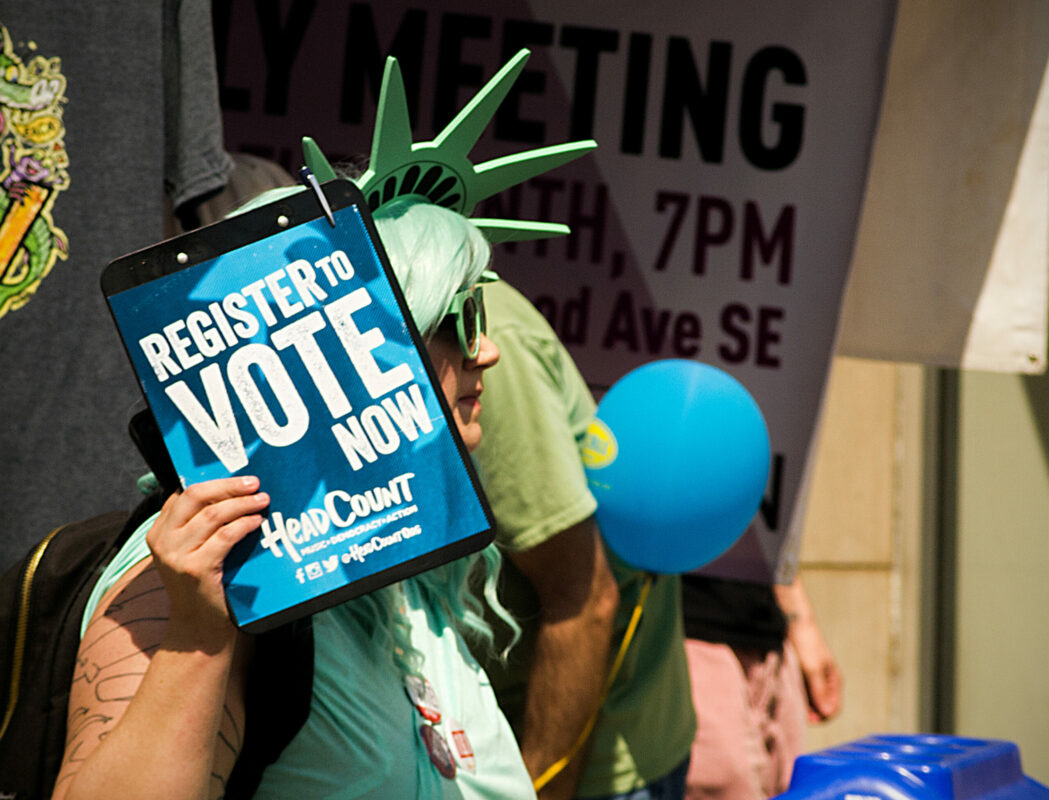Georgia Republicans are under fresh fire from voting rights advocates after introducing what critics called a “devastating” new measure to restrict poll access in the state.
“It’s open season on voting rights in Georgia,” U.S. Rep. Hank Johnson (D-Ga.) told the Associated Press.
The omnibus bill, Senate Bill 241, aims to “comprehensively revise elections and voting.” As the Atlanta Journal Constitution framed it, the measure “would take a number of restrictive steps even many top other Republicans haven’t endorsed.”
Voting changes put forth in SB 241 include the elimination of no-excuse absentee ballots, requiring a photocopy of a state-issued ID to accompany absentee ballots, and curtailing of mobile voting spots. “Poll hours may be extended only by order of a judge of the superior court of the county where the precinct is located upon good cause being shown,” the bill adds.
Passage of the measure would give the state “one of the most restrictive absentee-by-mail voting laws in the country,” according to GPB News, the local NPR affilaite.
The outlet added:
The bill would ban the SEB [state election board] from entering into consent agreements without a joint resolution of the General Assembly, which stems from conspiracies pushed by former President Donald Trump and others that the state illegally settled a lawsuit that changed absentee ballot procedures in 2020 that led to widespread fraud. There is no evidence of widespread fraud and the settlement, approved in a case presided over by a George W. Bush-appointed judge, instructed state elections officials to remind county officials to provide timely notice of absentee rejections. […]
Much of the omnibus measure would direct local elections officials to report the total number of votes cast as soon as possible after polls close and then have them count ballots without stopping until everything is complete, a challenge for larger counties that have hundreds of thousands of ballots to count after the 12-hour election day period.
The bill would also require judges to hear election lawsuits within two business days of filing and decide them as soon as possible. Trump and his allies filed cases seeking to challenge Georgia’s votes at every single level of the judiciary, from Fulton Superior Court to the U.S. Supreme Court and lost them all.
SB 241 followed the introduction last week of House Bill 531, which, as Common Dreams reported, would also limit access to the polls. Among other actions, HB 531 would notably eliminate early voting on Sundays, when Black churches hold “Souls to the Polls” events.
As such, the measure has “led many to suggest Republicans are trying to stop a successful effort to boost Black voter turnout in Georgia, where they make up about a third of the population and have faced a dark history of attempts to silence their voices in elections,” AP reported.
Thank you @Center4NewData for the providing a thorough analysis of why Saturday and Sunday voting is so important to Black Georgians and working families across the state. #GaPol
Here the full report I cited during today’s testimony: https://t.co/0hVDRL0kFP https://t.co/6IYEpaoe1a
— Rev. James Woodall (@iMajorWish) February 23, 2021
Georgia was pivotal to giving Democrats control of the White House—the typically red state went for Joe Biden, prompting Trump’s pressuring of state officials to overturn the election results. Subsequently, the runoff victories of Raphael Warnock and Jon Ossoff that took place in January also pushed the U.S. Senate into Democratic control.
Speaking with MSNBC‘s Chris Hayes Tuesday, author and Mother Jones journalist Ari Berman called Georgia “ground zero for voter suppression,” referring to the response by the state GOP to “roll back all the voting methods that led to that record turnout” in 2020.
Referring to the false narrative by Trump and other Republicans of election fraud, Berman said that Republicans “knew that Donald Trump didn’t win the state of Georgia but they knew that if they created enough doubt, if they manufactured enough of a crisis they could introduce all these laws in response to the ‘crisis’ that would fit their political goals.”
Danielle Lang, co-director of voting rights at Campaign Legal Center (CLC) also expressed concern about the legislation proposals in the Peach State, warning in a statement Wednesday that “it would be devastating for voting rights.”
“This partisan effort is part of a larger disturbing trend of restrictive voting bills that are gaining steam across the U.S. this year,” said Lang. “Election laws should be structured to increase voter participation, not to suppress it.”
“The best way to strengthen confidence in our elections is for lawmakers to stop spreading false claims about the security of the 2020 election. No-excuse absentee voting is used by 34 states and was passed on a bipartisan basis in Georgia in 2005. After a record 1.3 million Georgians voted in 2020, there is no reason to move backwards,” she added.
Common Cause Georgia also sounded alarm earlier this month about a slew of election-related measures in Georgia.
“The breadth and depth of these anti-voter proposals is stunning,” said Aunna Dennis, executive director of the group.
“It seems some of our elected officials have forgotten who they’re supposed to be working for,” Dennis said.
The voter suppression proposals are being met with push-back from Fair Fight Action—a group founded by former Democratic Georgia gubernatorial candidate Stacey Abrams.
The group launched a new ad campaign this week targeting the GOP proposals in which the group says, “Georgians of both parties have voted by mail for decades. Almost half a million Georgia Republicans did it just last year. The GOP knows voting by mail works, it was their idea.”
“It’s how Republicans have been winning Florida. But now, the same Georgia politicians who passed these laws want to make voting harder. That means longer lines, higher taxes, harder for you,” the ad states. “Tell Georgia politicians: don’t mess with Georgia’s voting laws.”
This article first appeared at Common Dreams and is republished with permission.
